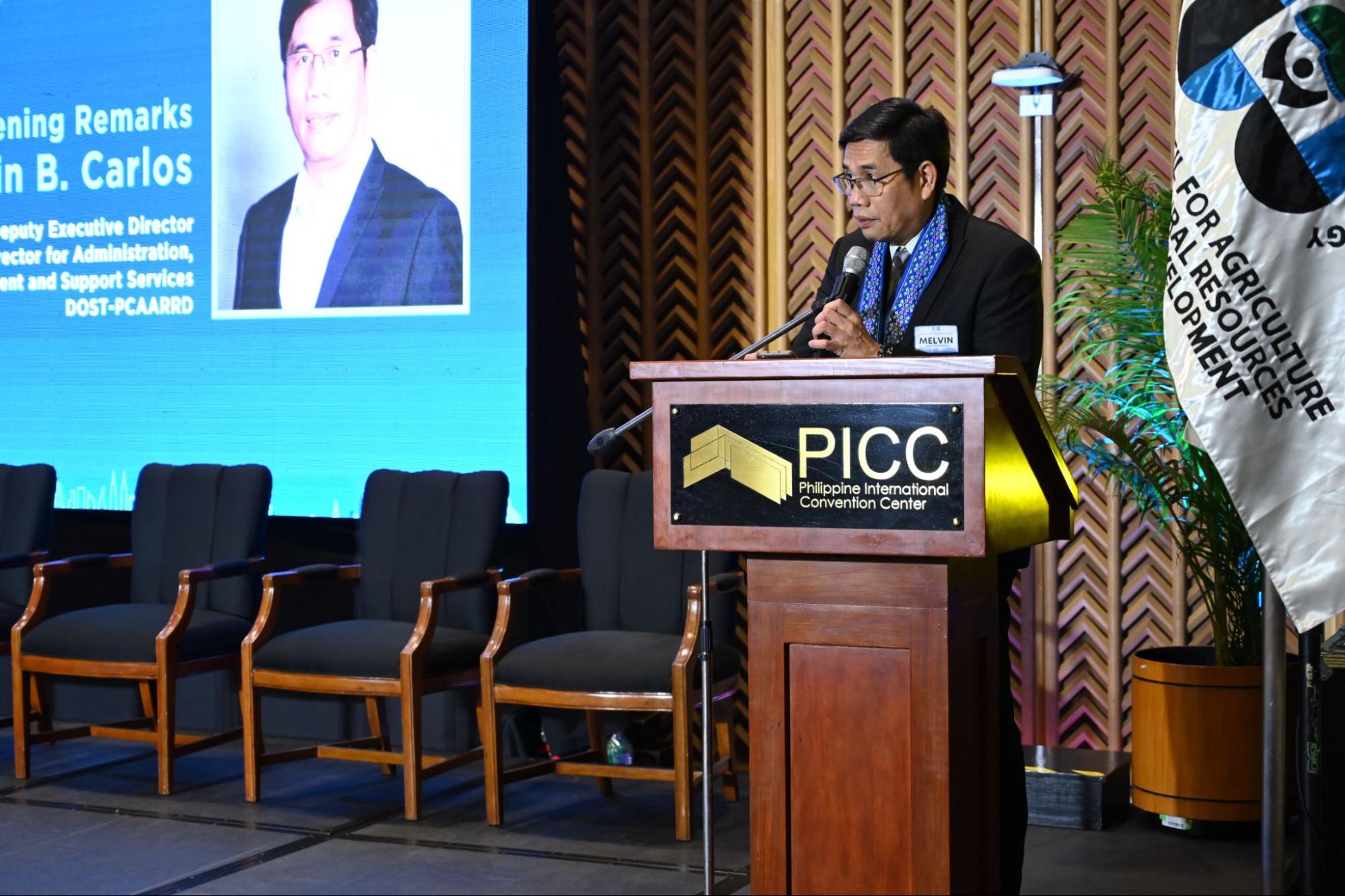The Philippine Council for Agriculture, Aquatic and Natural Resources Research and Development of the Department of Science and Technology (DOST-PCAARRD), through its Socio-Economics Research Division (SERD), introduced the framework through the event, Sustainable Horizons: Introduction of the Proposed Foresight Framework on September 7, 2023 at the Philippine International Convention Center. The proposed DOST Foresight Framework was presented and demonstrated its application through several case scenarios.
The initiative is aligned with the DOST-funded and SERD-implemented project, Development and Institutionalization of DOST Foresight Framework and Protocol or the DOST Foresight Project, which focuses on capacity building and the development and institutionalization of the mentioned foresight framework.
DOST-PCAARRD Deputy Executive Director for Administrative, Resource Management and Support Services Melvin B. Carlos emphasized in his opening remarks the importance of foresight, “DOST is pushing the boundaries of science and technology, making impacts felt across sectors and industries and igniting breakthroughs; and paving that way towards a better future requires exemplary foresight or the ability to foresee emerging challenges as we move and operate through the changing development context.”
DOST Undersecretary for Scientific and Technical Services Maridon O. Sahagun, shared in her message of support the need for the Philippines to also begin treading a path to foresighting, “As we have seen in many countries like Japan, Singapore, and Germany, the adoption of foresight methodologies has been proven useful in guiding policy makers and planners in governments. Its anticipatory and participative methods have helped these governments navigate and shape their industrial policies and development agenda. With the increasingly globally competitive and fast-paced landscape, it is imperative that we future-proof our long-term planning and development strategies.”
Meanwhile, SERD Director Ernesto O. Brown presented the rationale and objectives of the introductory activity, then as followed by a brief lecture of Academician Rhodora V. Azanza on PAGTANAW 2050, a national foresight compendium encompassing significant drivers of change and plausible development paths for the Philippines, as well as prospects on Blue Economy.
SERD Senior Science Research Specialist Mia Barbara D. Aranas then presented the proposed framework. A culmination of tools and methods catering the successful conduct of a foresight exercise, the framework is composed of eight components: Scoping, Shared History Mapping; Scanning and Analytics; Scenario Building, Capturing Insights; Implications to Actions; Re-envisioned STI Environment; and Foresight monitoring and evaluation (M&E). The first five components comprise the foresight exercise– from scoping to future intelligence gathering and scenario building. Insights and ideas conceptualized from this endeavor are reflected in the creation of more future-oriented research and development (R&D) agenda and strategic roadmaps.
To demonstrate the applicability of foresight in the planning process of DOST, Rachelle Anne L. Miranda, Project Development Officer IV, DOST Office of the Secretary, Disaster Risk Reduction and Climate Change Unit; Melissa C. Bulao, Supervising Research Specialist, Philippine Council for Health and Research Development; and Kimberly Zarah B. Locsin, Science Research Specialist II, Crops Research Division, DOST-PCAARRD shared their outputs from the Strategic Foresight and Scenario-Strategy Development Masterclass, a training program from the capacity building phase of the DOST Foresight Project. Topics of these outputs include Climate Change Adaptation, Emerging Health Issues, and the Future of Crops R&D in the Philippines.
DOST Planning and Evaluation Service Director Cezar R. Pedraza also laid down initial plans to institutionalize foresight within the department by aligning the national, regional, and institutional efforts of several DOST agencies. Lastly, the Founder, Chief Futurist, and Executive Director of the Center for Engaged Foresight Shermon O. Cruz imparted his knowledge on opportunities, challenges, and lessons in the application of foresight–specifically in the context of strategic planning for government agencies.

From left to right: Dir. Cesar Pedraza, Mr. Shermon Cruz, Acd. Rhodora Azanza, Ms. Kimberly Zarah Locsin, Ms. Melissa Bulao, Ms. Rachelle Anne Miranda, and Ms. Mia Barbara Aranas during the open forum. (Image credit: Socio-Economics Research Division, DOST-PCAARRD)
To close the event, DOST-PCAARRD Deputy Executive Director for R&D Juanito T. Batalon expressed his heartfelt gratitude to all participants and speakers of the event. He hopes that by hearing first-hand experiences shared by the plenary speakers, others will also take on the hat of a foresight practitioner. He ends his message by saying that “foresight is not just a tool or a technique, but a mindset and culture that we advocate in DOST, and a way of engaging with the world that requires us to imagine the future we want to create and work tirelessly to make it a reality.”

